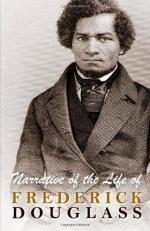Very soon after my return to Baltimore, my mistress, Lucretia, died, leaving her husband and one child, Amanda; and in a very short time after her death, Master Andrew died. Now all the property of my old master, slaves included, was in the hands of strangers,—strangers who had had nothing to do with accumulating it. Not a slave was left free. All remained slaves, from the youngest to the oldest. If any one thing in my experience, more than another, served to deepen my conviction of the infernal character of slavery, and to fill me with unutterable loathing of slaveholders, it was their base ingratitude to my poor old grandmother. She had served my old master faithfully from youth to old age. She had been the source of all his wealth; she had peopled his plantation with slaves; she had become a great grandmother in his service. She had rocked him in infancy, attended him in childhood, served him through life, and at his death wiped from his icy brow the cold death-sweat, and closed his eyes forever. She was nevertheless left a slave—a slave for life—a slave in the hands of strangers; and in their hands she saw her children, her grandchildren, and her great-grandchildren, divided, like so many sheep, without being gratified with the small privilege of a single word, as to their or her own destiny. And, to cap the climax of their base ingratitude and fiendish barbarity, my grandmother, who was now very old, having outlived my old master and all his children, having seen the beginning and end of all of them, and her present owners finding she was of but little value, her frame already racked with the pains of old age, and complete helplessness fast stealing over her once active limbs, they took her to the woods, built her a little hut, put up a little mud-chimney, and then made her welcome to the privilege of supporting herself there in perfect loneliness; thus virtually turning her out to die! If my poor old grandmother now lives, she lives to suffer in utter loneliness; she lives to remember and mourn over the loss of children, the loss of grandchildren, and the loss of great-grandchildren. They are, in the language of the slave’s poet, Whittier,—
“Gone, gone, sold
and gone
To the rice swamp dank
and lone,
Where the slave-whip
ceaseless swings,
Where the noisome insect
stings,
Where the fever-demon
strews
Poison with the falling
dews,
Where the sickly sunbeams
glare
Through the hot and
misty air:—
Gone, gone, sold and
gone
To the rice swamp dank
and lone,
From Virginia hills
and waters—
Woe is me, my stolen
daughters!”




